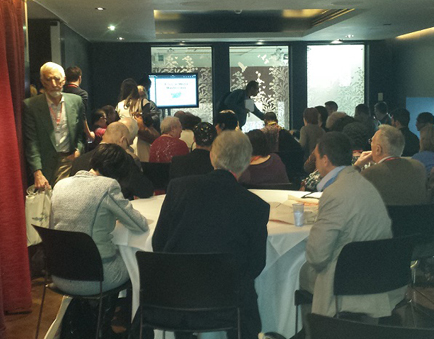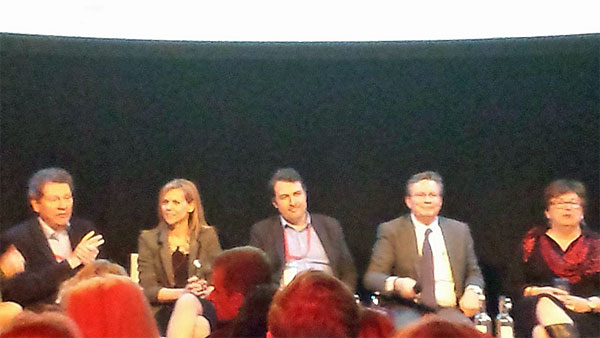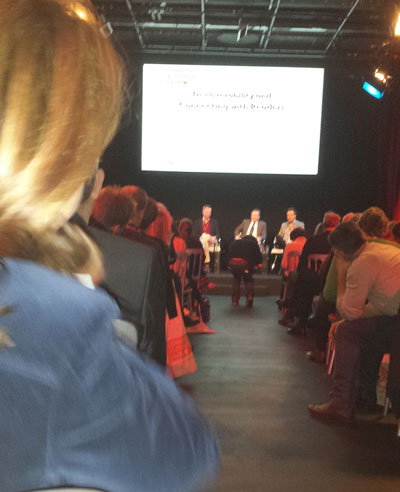
The Business Of Books
The first of the International Author Fair series organized by Authoright kicked off in London Friday February 28th. Its mission: to equip authors with the commercial, technical and political knowledge of where things are in the business of books and where they are going.
The event is a sure sign that the industry is coming to terms with change and realizes it needs to create some kind of structure amid the new trends led by Amazon and indie publishing. Indeed, according to the panel chaired by the genial Porter Anderson around 75% of books could well be self-published by the year 2020.
But this is not 2020 and the real challenge in today’s changing world for both for writers and readers, is recognizing and sorting out the junk from the good stuff. There is apparently an awful lot of self-published books that really are not up to standard, consequently much of the discussion was about means of professionalizing indie publishing.
I was surprised, though, that nothing was said about book approval platforms such as indieBRAG, which constitute a filter for the reader and a pedestal for the writer who is serious about their work.

Workshops, Seminars And A Place To Pitch
The London Author Fair or LAF14 comprised 21 workshops and 8 seminars from how to publish on ereader platforms to marketing your book.
I particularly enjoyed the QA workshop with Patrick Brown, Director of Author Marketing at Goodreads, who had some great tips for the GR platform. In case you didn’t know, Goodreads is a formidable meeting place where readers discuss, choose and suggest books. It is also a place where authors can engage with their readership.
One tip I will take on board is to rate your own book. I have always resisted this thinking it would be unethical and badly perceived by readers. The way to deal with this, according to Patrick Brown, is to not review your book but to give some extra info about, say, why you wrote it. This will be seen by the reader as added value. Of course, you will give your book 5 stars, let’s face it, if you don’t utterly believe in your work who else will?
During the end-of-day aperitif I asked Patrick about trolling on Goodreads, by trolling I mean those faceless profiles that give your book 1 star without leaving any comment. For a newly published book a single 1 star rating can be devastating. I understand the need for GR to allow ratings without reviews but I asked if ratings with reviews (good or bad) could be given more weight.
Another solution which was suggested by the cluster of authors around Patrick was to give regular bona fide reviewers more gravitas. That said, nothing is in the pipeline for the near future to limit this type of trolling, but my idea is if we harp on about it enough then something will inevitably have to be done.
Other industry actors like Nook, Kobo, Kindle, Blurb were there along with a handful of agents. It is a pity and highly significant that none of the major publishers were present, which only goes to show just how far away they have drifted from the grass roots of their profession i.e. the authors.
Authors are entitled to pitch to one agent only, though you have to put in your demand early as it is dealt with by LitFactor on a first-come-first-serve basis. That said, if you didn’t get in quick enough there was ample opportunity to approach agents between workshops and at the end of the day. My take is even if you want to remain independent you might need an agent who will give you guidance as well as help with the promotion.

Big Publishing Brain Storm
The closing seminar entitled Big Publishing Brain Storm brought out the panel consensus that the divide between indie and traditional publishing would be plugged. Indeed, Gareth Howard, cofounder of Authoright with Hayley Radford, says his team has already dropped the ‘self’ in self-publishing.
Panel members also said that by 2020 the number of writers would mirror that of readers. I find that difficult to believe as after all, writing a book in quality, can take years of practice and learning. To my mind, only those with the irrepressible passion that keeps them from pleasurable sociable activities or keeps them at their desk when the kids have gone to bed will be capable of completing that “training” so that they can go on to create books of quality that stand the test of time.
The team at Authoright did a remarkable job of bringing together both indie and contract authors around industry experts during this first ever London Author Fair. Their next International Author Fair is to take place in the autumn in New York. It’s well worth keeping an eye out for the exact date.
Paul Monk
A lot of the points recounted in this article were quite asinine. As many writers as readers? How about as many concert pianists as listeners? That’s such a vapid idea, it’s hard to believe someone actually said it.
Also, how do you conflate traditional publishing and self-publishing? (The “divide. . .would be plugged”) By changing the name? You’ve got to be kidding! You’re either published by the will (or whim) of gate keepers, or by your own inclination. That’s a distinction of some magnitude and it’s hardly bridged by a name change.
There is, however, a need for qualitative distinctions between books. All writing isn’t of the same quality, and all stories are not equally compelling. I don’t think that “managing” that at publication is the answer–that’s what traditional publishing was supposed to be. And we have ALL read poorly conceived, ineptly written books that came out of the “big houses.”
The answer is already here: review platforms such as Indiebrag (and all of the other reviewing institutions who accept books for review with the understanding that they will receive an unbiased appraisal) separate the wheat from the chaff.